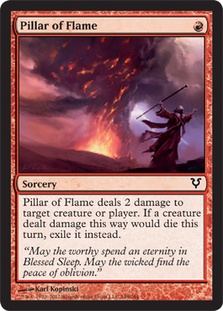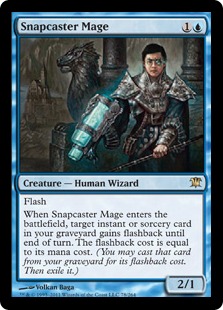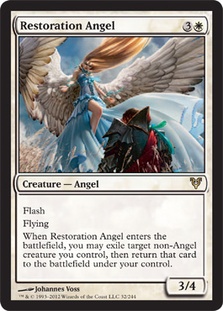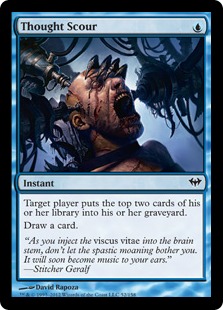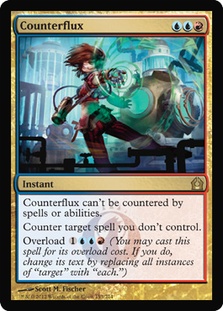Let’s take a trip to Magic’s past.
"Who’s The Beatdown?" remains to this day one of the most influential MTG strategy articles in existence. Why is that? This piece, more than most, expresses the importance of having a plan to win the game and executing it. I won’t go into too much detail about Mike’s article, as there is no reason to mess with perfection; however, I do want to take a slightly different approach to the topic. What happens when the decks are set up identically? What happens when your control deck has to get aggressive starting from the second turn?
I would argue that the greatest weakness for average level players is the desire to cast cards because they have them without following a plan of attack. This can happen in a wide variety of matchups but occurs frequently in control mirrors. While Sphinx’s Revelation may be the most objectively powerful instant in the current format, Restoration Angel is the midrange threat that can ambush an opposing attacker while also providing a very reasonable amount of value and offense.
Imagine the following scenario. You are playing a sideboarded game in the U/W/R Midrange mirror. You play your fourth land and pass the turn with three lands, Restoration Angel, Sphinx’s Revelation, Azorius Charm, and Thought Scour in your hand. Your opponent puts his fourth land into play and also passes the turn. Do you cast the Angel? Why? What’s your plan? What are the possible outcomes?
1. You could cast the Angel and have it resolve, untap, drop your fifth land, and attack for three unhindered points of damage. (Probably the best-case scenario.)
2. You could do the same as above, with the difference being your opponent casts his own Angel to prevent the damage. (Unlikely since opening himself up to a resolved planeswalker could be catastrophic.)
3. Same as #1 except your opponent, being rational, decides that with you already having a clock in play he must act, so he begins casting spells. At this stage, allowing a premium spell to resolve reveals too much information, and your opponent will begin to overwhelm you with threats. (Unlikely that your hand can compete with a series of resolved threats.)
4. Your Angel could get countered, causing you to settle back into a draw-go game in which you have plenty of land drops and cantrips but lack action to compete with resolved threats. Position is questionable depending on how your opponent wants to approach the game. (Favored in a draw-go scenario but weak to an action-heavy hand.)
With plenty of other possible outcomes, it becomes clear as we rationalize our way through the plan that we want to maneuver ourselves into a draw-go game in which our opponent doesn’t feel obligated to cast spells (that we can’t currently answer).
Casting Restoration Angel, while seemingly harmless and rational, changes the pace of the game away from our desired plan.
Sticking to the Plan
Imagine you’re in a tournament playing U/W/R Midrange once again and your first round of play is against someone you believe is playing a very similar deck. On the play, you mulligan into a hand that is three lands, Pillar of Flame, Snapcaster Mage, and Restoration Angel. This hand is incredible against an aggressive deck and is certainly better than a mulligan to five against the predicted opponent.
After your opponent leads with Hallowed Fountain, you have one more draw step of information to build the entirety of your plan around. Your draw for the turn: Pillar of flame number two. How do you win with this set of cards? Of course, it’s obvious! Play the Pillar with intention to Snapcaster it for your turn 3 play to begin the clock. Our opponent does nothing other than make a land drop for his second turn. The card we draw for our third turn is Thought Scour. What now? With new information revealed, we can begin to assemble a card advantage plan of Thought Scour milling us and Snapcaster Mage. Is that good?
Simple control logic insists that playing your card draw spells to ensure hitting your early land drops is vital. Will playing a fourth or fifth land help us win this game? Absolutely it will. At the cost of tempo? That is not as clear. Some fortunate things have to happen in the control mirror for the player that had to mulligan and start with two shocks to win the game. I would vouch that from this stage in the game, switching plans doesn’t make sense. Making the aggressive play of Snapcaster Mage into Pillar may provide us the opportunity to take advantage of a clunkier start from the opponent.
Our enemy plays a Runechanter’s Pike followed by a comes into play tapped land for his third turn, telling us a few things. Presumably, he has no source of cantripping since that would have been cast at the end of our third turn. We can also assume that our opponent doesn’t have a way to interact with us at two mana like an Essence Scatter or Syncopate since, in this context, a resolved Pike means nothing. So what could he have? More expensive counterspells such as Dissipate or Counterflux makes sense, as well as a smattering of lands, Restoration Angels, and Snapcasters he hasn’t had a chance to deploy yet.
As we draw our fourth land right on time, we use the information we have gathered and cast our own Angel after combat. We sacrifice some value Blinking Snapcaster without being able to cast the Pillar in our graveyard; however, we can’t waste the clear opportunity to resolve what may be the last important spell we get to cast this game (arguably the first as well).
After the opponent puts his fourth land into play, we have almost full information of what is important. It’s pretty obvious at this point that he has an Angel; otherwise his hand would have been unkeepable. The enemy is very competent and decides to play his Angel at sorcery speed, preventing us from topdecking a devastating counterspell. Our draw step this time yields Snapcaster Mage to add to the Pillar and Thought Scour we are already holding.
The enemy is at fourteen life; we attack, all but forcing his Angel to fight our Snapcaster. Clearly at this stage we are committed to casting Pillar to clear out his Angel. Sticking to our plan of attack, we use the remaining three mana to Snapcaster the Pillar, dropping the opponent to a precarious nine life.
After a quick turn of land number five and passing from our opponent, we draw Counterflux. More information to sift through. Our opponent just played an Angel at sorcery speed on his previous turn to get around countermagic. What changed? A resolved Angel is just as important if not more than it was a turn ago, so why did he not take the opportunity to play something while my mana was spent? The only answer that stands to reason is that he is content with his play for this turn getting countered.
Our attack force drops the opponent to four life. His end of turn Sphinx’s Revelation for two has already been targeted as the spell he is allowing to be countered. We decline, allowing him to go to six life and untapping with a full grip of cards. He begins by casting Desperate Ravings; after discarding a Geist of Saint Traft, the enemy put a sixth land into play and passes to us. Pillar of Flame number three is quite the bargain, as we use Counterflux on his attempt at an Angel and the red sorcery at him to steal game 1 while never casting the Thought Scour we drew on our third turn.
This scenario was my reality! Round 2 of the Invitational in Los Angeles, I was paired against Michael Hetrick, and that was a play-by-play of our first game from my point of view. The importance of this analysis is not that I won the game. A simple Supreme Verdict would have immediately ended the game in Hetrick’s favor. (Probably not in his deck with Geist, but I didn’t know that until the final turn either.) What is important is to imagine yourself winning the game. How does the board look as you win in that mental image? As the game was developing, I had two Pillars and three lands and wasn’t winning a fight over Revelation anytime soon, so I built my plays around an image of me winning before his card advantage had time to matter.
Nothing Extra
You get three match points for winning a match of Magic and zero for losing. Simple, right? Incredibly obvious, yes? Then why do people insist on making winning so difficult for themselves? You don’t get extra points for winning on a mulligan to five; you don’t get extra points by defeating your opponent with seven cards in hand, and you certainly don’t get extra points by complaining about your losses.
You have to know your range! With as much analysis as we just went through, it may shock you to hear me say that I don’t go this deep into detail every game. Many intelligent people could find correct lines of play given an eternity. You win by doing what comes natural! That Game 1 between Hetrick and me lasted twelve minutes and ended on my turn 7. I took time to think about practically none of those plays, yet there was an enormous amount of strategy piled into them. I had been playing decks like this all season and was very aware of how you have to approach some miserable looking games in order to win, as was Michael.
Your Opponent Wants to Win
Coverage of the Invitational can be found here. Take a second to look at my round 4 feature match against Joseph Loster. At 6:50 I cast Jace, Memory Adept, choosing to draw a card and mill myself for one.
We’d played two full games at this point, so he had quite a bit of information that may not be immediately obvious to the viewer. Most importantly, he could assume that I did not have Unsummon in my deck, which gave him free rein. With that knowledge and a Charm in hand, he didn’t have to commit the second Angel to the board to deal with Jace; he could hold it to rebuild from a future sweeper.
What he didn’t take into consideration was that my entire series of plays were all predetermined and had his Charm in mind. You see, the Pillar I drew, while incredibly telegraphed, was a card I didn’t want to draw. I considered using it on the Wolf token, but if I did then the Charm could no longer deal with Jace, so he’d be forced to play the Angel (which I didn’t want him to do).
I wish for the sake of argument that I hadn’t wasted everybody’s time with that Restoration Angel chump block. It was completely predetermined, and I was just double-checking my calculations to verify no other block kept Jace alive through a Charm. Joseph almost immediately figured out what had happened and was stuck. I was going to cast Supreme Verdict on my next turn. With him stuck on four lands, he only had two real choices: make the play he did to force my hand on Verdict while setting up his mana or deal Jace two damage and plan to cast the Angel after I swept the board on the following turn. Both scenarios were abysmal for him and were set up by the fact that I had planned for the two cards he was holding while also playing to his desire of holding back threats.
Your opponent wants to win. In on-camera matches, amateur players almost always either play poorly or very simple ABC Magic. The problem with this is simple. Assuming your opponent is rational, the simple plays are the easiest to dissect. How odd does that chump block look at first sight? I could tell instantly that block wasn’t on Joseph’s radar by his reaction.
I’m ecstatic to read some feedback in the comments, as I much prefer to write about theory than tournament reports of which there are so many or decklists that I don’t have the time to test myself. Take care everybody!
Cvalenti90 on Magic Online

